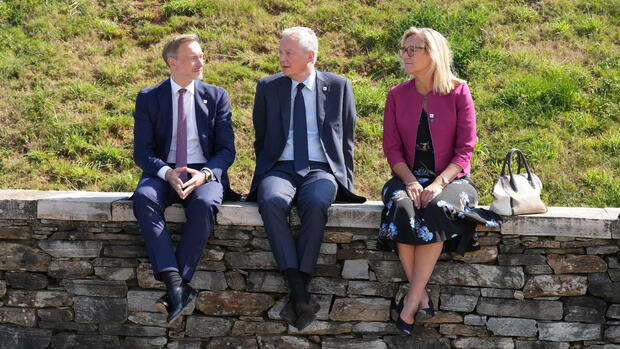Above all, Lindner wants to prevent countries in the monetary union from accumulating high levels of debt with impunity.
(Photo: dpa)
Santiago de Compostela Is there any sign of an agreement on the EU debt rules? Anyone who listened to Federal Finance Minister Christian Lindner (FDP) and his French colleague Bruno Le Maire at the finance ministers’ meeting on Friday got the impression that they were not that far apart. Both emphasized the need for stable government finances and the high level of investment required for innovation. Both also confirmed that the reform should be in place by the end of the year.
Lindner himself noted how similar the ministers gathered in Santiago de Compostela sounded. Everyone agrees that reliable, realistic rules are necessary, said the FDP politician. “Everyone is talking about the need to restore fiscal buffers. And everyone is talking about the need to enable investment.”
But the similarities end at this general level. Because Lindner and Le Maire are still in opposing camps. Some, in addition to France, other highly indebted countries such as Italy and Greece, want to achieve as much flexibility as possible in reducing debt. Otherwise they would lack the fiscal policy leeway to invest in the future of their economies. They would also like to have some sort of “golden rule” to exempt certain investments from debt rules.
Lindner, on the other hand, wants above all to prevent countries in the monetary union from accumulating high levels of debt with impunity and thus laying the foundation for the next debt crisis. That’s why he insists on binding requirements, such as requiring highly indebted countries to reduce a certain proportion of their debt every year.
The German Finance Minister emphasized in Santiago that there was still a disagreement on the technical details of the reform. That’s why we will “certainly stay in touch for a little longer”. At breakfast on Saturday morning, the ministers wanted to address the remaining sticking points.
Lindner still has room for improvement
The talks are based on a draft law that the EU Commission presented in April. In it, the authority proposes to agree on a tailor-made debt reduction plan with each government in the future. It should no longer be about meeting the Maastricht criteria again within a certain period of time (national debt of a maximum of 60 percent of economic output, annual new debt of three percent).
Rather, in the future it should be enough to put the debt on a downward path within four years. This path is determined using a debt sustainability analysis that takes into account long-term economic developments in the respective country.
>> Read here: Le Maire calls for room for investment
From the Commission’s perspective, this broader approach ensures that debt remains under control without forcing countries into economically damaging austerity measures.
In the Lindner camp, however, there is a fear that the many parameters in a debt sustainability analysis will lead to a country’s financial situation being glossed over. There is also a risk that the bilaterally negotiated debt reduction plans will be based more on political considerations than on purely economic grounds. He is therefore calling for additional “safeguards”, such as the requirement that the debt level at the end of the four years must be lower than at the beginning.
Number of supporters is growing
To prove that Germany is not isolated in its insistence on discipline, Lindner published a joint guest article with ten other countries in June. Several Eastern European countries as well as Austria, Finland and Luxembourg signed. The group called for “quantitative criteria that apply equally to all Member States”. The federal government presented concrete suggestions as to what these criteria could look like in two papers that were not to be published.
The Federal Minister of Finance is keen not to appear as a mere brake on things.
(Photo: Bloomberg)
In the meantime, the support camp is said to have continued to grow. In the discussions at the technical level, Lindner’s officials are in the process of explaining the German proposals and clearing up “misunderstandings”. The persuasion has at least resulted in the initially harsh criticism from Paris being much quieter.
In Santiago, Le Maire emphasized the similarities with Lindner. Before the meeting, the two also published a joint guest article on the Capital Markets Union.
Lindner is also keen not to appear as a mere brakeman. That’s why he emphasizes at every opportunity that Germany has already come a long way and is ready to accept more flexible rules. He wants to prevent any further softening. To his relief, a number of colleagues share the view that a certain culture of stability is essential for the survival of the euro.
More: Is the EU counting on manipulated figures when it comes to debt rules?
